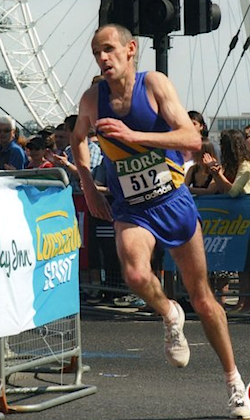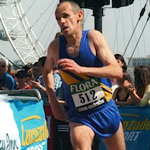Marathon Training Presentation
North Shields Polytechnic Track
Darran Bilton – 4th March 2012
The Marathon in a Nutshell!
 Sean Kelly kindly invited me to North Shields Polytechnic track on behalf of Tyne Bridge Harriers, to give a presentation on how to prepare for a marathon, how the race is run and what nutritional considerations should be made. Obviously, books are written on the subject so I wouldn’t insult the attendees by suggesting that a two-hour interactive presentation could possibly comprehensively cover the subject of the marathon. So instead, I chose to talk about the essence and indeed the essentials of the marathon…
Sean Kelly kindly invited me to North Shields Polytechnic track on behalf of Tyne Bridge Harriers, to give a presentation on how to prepare for a marathon, how the race is run and what nutritional considerations should be made. Obviously, books are written on the subject so I wouldn’t insult the attendees by suggesting that a two-hour interactive presentation could possibly comprehensively cover the subject of the marathon. So instead, I chose to talk about the essence and indeed the essentials of the marathon…
Introduction – What the Marathon means to me
In 490BC Persians landed a force of 20,000 men on the shore of Marathon in an attempt to conquer Greece. The Greek army was outnumbered so sent a messenger to Sparta for assistance. The distances ran and the story that the Spartans were too busy having a festival to help, yet the Greek army kept their enemy at bay nevertheless, is not really as important as the inspiring essence of a runner named Pheidippides that completed unfeasible distances before dying. And hence, the legend that is the marathon was born. Yet it wasn’t until 1908 in London that the distance of 26.2 miles was established.
All interesting stuff, yet I seriously believed the 26.2-mile race was actually ‘fools gold,’ embarked upon by the runners happy to spoil their performances for weeks before and after the race in the chance that they may have a good run!
That was until one April (1997) when I was down in London to see the horse racing at Sandown. I had a run from the hotel in Sutton and whilst out, I experienced a new kind of heckling – no “knees up” but instead “are you running today, mate?” Running what? Of course, it was the day of the London marathon; there was a party involving some 36,000 runners and around 2 ½ million supporters, and I wasn’t invited!
“That’s it” I thought, “I will run next year’s London marathon just to prove it’s not all that.” Except I had to run a sub 2.45 to get a championship front row start (if I’m going to run one London marathon, I may as well give it a proper go) so I trained for and ran the Manchester marathon the following October. I finished 4th in 2 hours 31 minutes and 7 seconds, qualifying me for the championship start. The following April I had a revelation – yes I ran the race. But much faster than expected. I got round in 2 hours 21 minute and 33 seconds, placing me as one of the top Brits and giving me a National ranking, something I had never enjoyed.
And hence, I’d caught the marathon bug! 23 marathons later I still think of the race as a mountain. But it has served rich rewards, such as Great Britain representations and trips abroad. I’m not saying you’ll enjoy such rewards, but crossing that finish line is reward enough for a race I have grown to love, if still keep at arms length with fear and trepidation.
The Good, The Bad & The Ugly
This gave the attendees chance to talk about their marathon best and worst experiences. Every single person had a great tale to tell, hence this part of the presentation ‘ran on’ (sorry!) a little longer than anticipated. But the experiences were too good to cut short. What came across more than anything else was why runners generally have a bad race; not bad luck, not weather conditions (though high winds guarantee a tough day), but poor preparation. It’s amazing that the only thing a runner has control over is the main reason for underperformance. Not surprisingly, the most popular reason for a great performance was, you guessed it – preparation.
Presentation – The Basics of Marathon Preparation
Nutrition
The typical western European diet consists of 55% carbohydrates, 30% fat and 15% protein. Contrasting with Kenyan diets that have a much greater carb content (70%) and much less fat (15%), it is easy to understand how taking the Kenyan approach to nutrition is a fuel-packed way to train. In the week before the marathon, lots of runners have experimented with depletion and loading techniques. This is potentially dangerous and an approach I’d rather not risk; a simpler risk-free approach is to consume plenty of carbs during this week (but no more calories than normal) and in conjunction with reduced miles run, will result in more glycogen (fuel) stored in the muscle and liver, for the big day. A sensible approach to hydration and balanced diet is always wise. It is worth noting than at best, only 250ml of liquid can be absorbed per hour. It is worth trying the drinks that will be provided on race day. Also, always take a carbohydrate + protein drink within 2 hours of completing long runs.
The Marathon Programme
A runner that enjoys a varied programme of running will typically have very easy days, some very fast running (‘reps’), some tempo work and lots of steady runs the rest of the time. To prepare for the marathon, a more structured approach is required to prepare the body for the arduous event. A simple way of looking at a marathon programme is to have a 12-week prep. The first 5 weeks should involve steady progression in terms of weekly mileages, but each week should include some short, fast runs (at 90% MHR; 8 X 30 seconds hills with jog recoveries, for example). The weekly long run should gradually increase, too. In the second 5-week ‘mesocycle,’ the weekly mileages should continue to increase, as should the long run distances. But also, some long tempo (75% MHR; 3 X 10 min tempo with 10 min jog, for example) runs and also some marathon paced runs (e.g. 5 miles easy, 5 miles marathon race pace). The final two weeks should be generally very easy, with a little up-tempo short drills (of around 80 metres) mixed in to occasional runs, slowly decreasing the distances, with no long runs. The pace that you will race the marathon can be calculated using various formulae from your 10k or half marathon times.
The Race Weekend
On race weekend, don’t let anyone ambush your plans, BUT don’t forget how much your family have given up to allow your obsession to take priority! If racing Sunday, collect your number on the Friday if you can, have your final big dinner on the Friday and just relax – if you are going to catch cold or fall over a curb, it is going to happen so live with it. On Saturday have a nice jog (no more than 2 miles) with some up-tempo drills (20 metres), but nothing to tire you. Have a nice breakfast and see a show, have a wander around with plenty of sit-downs and generally congratulate yourself for getting to this point. Stay calm and don’t obsess about the weather. It’s down to fate, my friend! Get your kit ready for the morning and have a good dinner (not too much protein and certainly nothing spicy). Don’t go to bed thirsty. Can’t sleep? No one can, but don’t worry. Get up early, have the same proven breakfast that works for you and get to the start nice and early. Keep warm and wear an old sweatshirt on the start line that you can bin once started. Concentrate on your pace – the early pace will dictate whether it is going to be a good or bad day, so be disciplined. Slow down for drink stops and carry out your drink plan, being flexible to accommodate changes in weather conditions. And please, enjoy this amazing experience!
After The Race
You’ve crossed the finish line! Now get some kit on and get some food inside you. This is very important for recovery and many people forget this. If you need a painkiller then that is okay (if approved by qualified medical staff) but NSAIDS (these are anti inflammatory) should be avoided (inflammation is part of the repair process). If you have a massage, it should be very superficial with very light stretching. Applying ice to sore muscles accelerates recovery (apply ice for 10 minutes only, but not direct to the skin). You shouldn’t drink alcohol for 72 hours (though if you feel the need to open the champagne, try not to over indulge). If you return to running in the next couple of weeks, the effort should be very easy and the distance gradual. It takes around one month for glycogen stores to return to normal, so don’t return to normal training too quickly.
Well, I suppose that is as brief as I could make it!
Enjoy your marathons and the adoration you quite rightly receive when you’ve finished.
Darran Bilton


3 Responses
Great read, and wish I’d managed to get there for the talk, but weekends seem to be a blur at the moment, what with Marathon training and kids!!
some very good advice in report, wish I could have made the talk. Not sure about the no beer for 72 hours after the race though.
The report has some nuggets of useful advice but the talk itself was memorable because of Darran’s delivery. He would have talked for a whole day if his wife hadn’t been coming back to collect him and drive him back to York (via Durham for some dinner). He has many anecdotes that all have a lesson in them for the competitive runner. Next time you see Darran at one of the big regional or national events, go up and speak to him, he’ll be happy to talk. The most important thing that I got from the meeting was that you should ENJOY your marathon training and racing as much as possible – not everyone is able to do what you can!